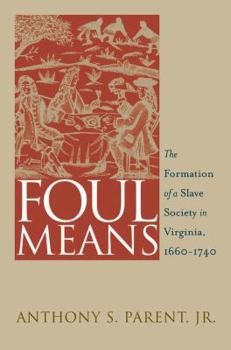Foul Means: The Formation of a Slave Society in Virginia, 1660-1740
Select Format
Select Condition 
Book Overview
Challenging the generally accepted belief that the introduction of racial slavery to America was an unplanned consequence of a scarce labor market, Anthony Parent, Jr., contends that during a brief period spanning the late seventeenth and early eighteenth centuries a small but powerful planter class, acting to further its emerging economic interests, intentionally brought racial slavery to Virginia.
Parent bases his argument on three historical...
Format:Paperback
Language:English
ISBN:0807854867
ISBN13:9780807854860
Release Date:September 2003
Publisher:Omohundro Institute and Unc Press
Length:312 Pages
Weight:1.06 lbs.
Dimensions:0.8" x 6.1" x 9.3"
Customer Reviews
2 ratings
Slavery was a pivotal cog in the colonial power wheel
Published by Thriftbooks.com User , 17 years ago
Those who have a passion for understanding the often complex, and sometimes, ambiguous, relationship between slavery and freedom in the colonial world will be pleased to read Anthony Parent's new work - Foul Means. This well written and exhaustively researched work discusses the aforementioned dilemma in Virginia from the mid-seventeenth to the mid-eighteenth century. The central argument is that the planter elite in Virginia, or "great planters," established America's racial dilemma. Modifying traditional colonial arguments, the author advances the thesis that planters were not conscious of their actions. "The analysis," contends Parent, "challenges the generally accepted belief that the shift to racial slavery was an `unthinking decision' on the part of a wide variety of aspiring planters who were responding to market and labor forces." (2) According to Parent, they knew that slavery was a pivotal cog in the colonial power wheel, and they carefully and consciously leveraged all available resources to tilt the balance in their favor. As for motivation, the planters were inspired by the ever shifting economic tides that existed between the New and Old Worlds. The author emphasizes the importance of labor in the early American south and in England. The crown initially supported servitude in the colonies as means to promote and encourage economic development in the New World, but as Parent carefully articulates, the English economists came to realize the pitfalls of this arrangement. Charles II implemented this philosophy and "promoted the slave trade to preserve English labor for England." (60) The development of the slave trade became, in essence, more economically and lawfully viable for the crown. Continuing with a tightly weaved chronological narrative, Parent discusses the role of tobacco as an impetus for class divisions in, and outside of, colonial Virginia. The lower prices of tobacco prompted the planters to look elsewhere for economic fervor. In short, they "promoted slavery as a remedy for the troubled tobacco economy." (81) The theme that planters were opportunists who monopolized each, and all, opportunities to suppress threats is well articulated by the author, and it is evident that their calculated manipulations shaped colonial America. Furthermore, their economic well being became a euphemism for freedom and the planters became so enmeshed with "white society in 1705," that they were "prepared to preserve racial slavery to the death." (129) Highlighting the significance of slave rebellions, Parent is one of the first scholars to illuminate that insurrections "threatened the order of Virginia society." (172) He pays particular attention to the Chesapeake Rebellion and ties it to the dual role Christianity played in the early seventeenth century. Initially viewed as a way of controlling slaves and Indians, it later became a catapult (i.e., rumors of Christianity leading to emancipation) for prompti
Powerful
Published by Thriftbooks.com User , 17 years ago
"Foul Means" is a powerful expose' of the history of slavery in the Virginia Commonwealth. Because of its importance in earlier American history, one can say, "As Virginia goes, so goes America." Thus, in many ways this book traces the course of slavery throughout the thirteen colonies and beyond and provides a moving picture of the ruthlessness involved in the enslavement of an entire race. Reviewer: Bob Kellemen, Ph.D., is the author of Beyond the Suffering: Embracing the Legacy of African American Soul Care and Spiritual Direction .





